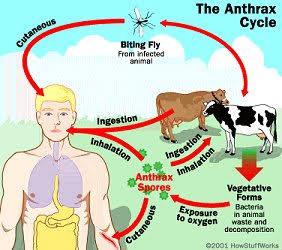
The Federal Ministry of Agriculture and Rural Development has alerted Nigerians on the outbreak of Anthrax in the northern part of Ghana bordering Burkina Faso and Togo, putting the whole West Africa Sub-region at risk.
The Ministry in the statement also warned individuals to desist from consuming hides popularly known as ponmo and bush meats among others.
ANTHRAX is a disease that affects animals and can spread to Humans.
Anthrax is an infection caused by the Bacteria, Bacillus anthracis
Usually the Bacteria can be in the soil, Animals become infected during feeding or breathing in contaminated soil, food or water. This then circulates in the system of the animals.
Humans can get infected by either breathing in the spores of the bacteria, or eating contaminated meat, milk, etc.
When the bacteria also touches a wound, it can spread into the bloodstream.
This is responsible for the various manifestation of the disease in humans.
Infection in humans can manifest from skin changes, or damage to the lungs or intestines.
It can actually be deadly if one doesn’t get treatment.
Some symptoms of infection could include: Flu, weakness, cough, fever, headache and if these are not attended to urgently can progress to Pneumia, problems breathing and shock
If you notice these symptoms, please go to a Hospital
What the WHO Says about Disease
The disease according to the statement has claimed some lives, hence the need for Nigerians to prevent contracting the disease the World Health Organisation, WHO, described as an infection caused by the spore-forming bacteria called Bacillus anthracis.
According to WHO, it is a bacterial disease that affects both animals and man. It is a zoonosis disease transmissible from animals to humans that typically affects ruminants such as cows, sheep, and goats).
The bacteria produce extremely potent toxins which are responsible for the symptoms, causing a high lethality rate. Humans can catch the disease from infected animals or through contaminated animal products.
It occurs naturally in soil and commonly affects domestic and wild animals around the world. People can get sick with anthrax if they come in contact with infected animals or contaminated animal products.
How people get infected with anthrax
People get infected with anthrax when spores get into the body. When anthrax spores get inside the body, they can be activated. The bacteria can then multiply, spread out in the body, produce toxins, and cause severe illness.
This can happen when people breathe in spores, eat food or drink water contaminated with spores, or get spores in a cut or scrape in the skin.
How animals get infected with anthrax
Domestic and wild animals can become infected when they breathe in or ingest spores in contaminated soil, plants, or water. These animals can include cattle, sheep, goats, antelope, and deer. In areas where domestic animals have had anthrax in the past, routine vaccination can help prevent outbreaks.
Where anthrax is found
Anthrax is most common in agricultural regions of Central and South America, sub-Saharan Africa, central and southwestern Asia, southern and Eastern Europe, and the Caribbean.
People get anthrax by: Breathing in spores, Eating food or drinking water that is contaminated with spores, or Getting spores in a cut or scrape in the skin. Working with infected animals or animal products
Shearing wool from a sheep
Most people who get sick from anthrax are exposed while working with infected animals or animal products such as wool, hides, or hair.
Eating raw or undercooked meat from infected animals
People who eat raw or undercooked meat from infected animals may get sick with gastrointestinal anthrax.
Who Is At Risk of Anthrax
Most people will never be exposed to anthrax. Anthrax is not contagious, which means you can’t catch it from another person like the cold or flu.
Laboratory workers who handle anthrax may be at risk for being exposed if proper safety precautions aren’t followed and people who handle animal products among others.
Travelers
Travelers should be mindful of what they eat and handle, as well as the souvenirs they bring home. Avoid eating raw or undercooked meat, and avoid contact with livestock, animal products and animal carcasses.
*With additional report from Vanguard
Follow us on Facebook/ twitter














